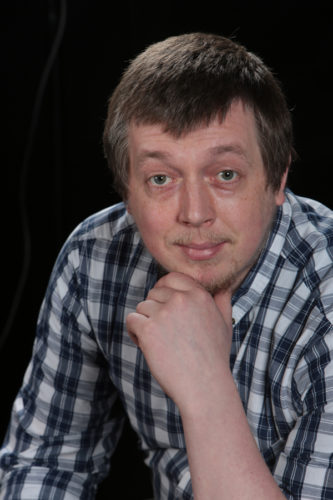


Director, principal director of Yaroslavl State Puppet Theatre. Winner of the diploma of the National Theatre Award THE GOLDEN MASK.
Alexei directed productions in puppet theatres of Russia, performed in the productions of Kukolny Format [Puppet Format] Theatre, was the principal director of Moscow Regional Puppet Theatre. He is the founder of the independent theatre group Theatre N.
In Smirnov’s productions, the means of puppet theatre are often combined with actors openly operating the puppets, and at the end the audience finds out who the puppeteers-storytellers are in reality; this always comes as a surprise and changes the audience’s perspective on the events. The Canterville Ghost is performed by Sir Simon and Virginia themselves, Gilded Foreheads are represented by the persecuted Capiton and Capitolina, Kind Rull is being composed by Charles Perrault and Eugene Ionesco.
Name. Smirnov Alexei Vladimirovich
Date and place of birth. 26 May 1978, the town of Rybinsk, Yaroslavl region
Education. Graduated from Rybinsk Pedagogical College in 1998, majoring as a preschool pedagogue-psychologist. In 2002 graduated from Yaroslavl State Theatre Institute, majoring in puppet theatre acting. In 2002-2005 studied at St. Petersburg State Theatre Arts Academy, majoring in puppet theatre directing.
In a nutshell about the career. From 2004 to 2012 worked at St. Petersburg State Philharmonic for Children and Youth as puppet theatre actor. From 2002 to 2012 worked as puppet theatre actor in Kukolny Format [Puppet Format] Theatre in St. Petersburg. In 2007 founded the independent theatre group Theatre N. From 2005 to 2017 directed over than 30 productions in various towns of Russia. From September 2012 to September 2015 worked in Moscow Regional State Puppet Theatre as the principal director. Since 2014 has worked in Yaroslavl Puppet
Favorite authors, subjects, stories:
Authors – Ray Bradbury, Ernst Theodor Amadeus Hoffmann, George Orwell, Daniel Keyes, William Shakespeare, Arkady and Boris Strugatsky, Oscar Wilde, Friedrich Durrenmatt, Mikhail Bulgakov, Alexander Green.
Subjects and stories – totalitarianism, utopias, myths, stupidity, morals, the other, the artist, self-sacrifice, victim, justice, mystics, horrors, search for happiness, and many other things.
Favorite traditional system of puppets/texture. Marionettes.
Does a performance need text? Yes, but it is quite possible to do without text. It all depends on the goals, which are set by the creators of a production.
Is the expression “puppet theatre” still relevant today? In the territory of the Russian Federation – yes.
What, in your opinion, is the difference between puppet theatre in Russia and the West? The most significant advantage, which is also a disadvantage, is that a puppet theatre company in Russia is a state budget institution. This brings such pluses, as the state funding of this theatre. Minuses – funding is provided irrespective of the quality of the ‘product’ which a theatre creates. And, what is most unpleasant, in this case taste and sense of proportion are important, but these aspects are subjective. From this point of view, private theatres (this is my opinion) are more honest (in Europe, most of the theatre companies are private). They work ‘at their own expense’ and, if a production is good, they are paid back by the audience. That is why western puppet theatre is closer to me. However, in our country – so that puppet theatre would work – state theatre institutions function, where programs and methods of system training of actors have been elaborated for years. This is a big plus. However, the principal issue is that a theatre institute should set the goals of educating top professionals and not just try to survive. In European puppet theatre there are more enthusiasts, although they might be amateurs. Yet, an amateur might be more valuable than a trained actor, who does not love his profession.
What can be useful about collaboration and cultural exchange? The development of mutual understanding between cultures and enrichment of the language of artistic expression. It is always interesting to find out something new and not to be afraid of trying. In my opinion, there is nothing more beautiful, than ‘a leap into the unknown’!